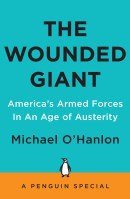
O'Hanlon's latest...
Michael O’Hanlon is one of those perpetually peripatetic Pentagon punditeers. When he’s not busy commenting from his perch at the Brookings Institution, the former Congressional Budget Office military expert is at Time appearing on Command Post (as he is Tuesday), penning an op-ed for the New York Times (as he did Monday), or traveling the world (he’s just back from Afghanistan). Battleland conducted the following emailed Q&A with O’Hanlon before he headed for the war zone.
The bottom line in his new e-book, The Wounded Giant: America’s Armed Forces in an Age of Austerity, is a lot like Defense Secretary Leon Panetta’s: precision-guided budget cuts – limited to no more than $500 billion over the coming decade – can be safely made through tougher management, changes in military compensation, and a smart reduction in the number of ground, air, and naval forces. Deeper cuts, he warns, are potentially catastrophic:
Is it fair to call America a “wounded giant”?
YES!!
If so, why?
We are still the giant — far and away number one in military power, far and away number one in the size and capability and economic power of the alliance system we lead, still tied for top in the world in manufacturing believe it or not, still the best in research and education, still the highest-ranking large country according to the Davos World Economic Forum competitiveness index — and yet we have an eroding manufacturing base, 9% unemployment, trillion dollar deficits, low national savings, a dispirited public, and broken politics.
What’s the most important thing you learned/realized by doing this book?
How hard it is to do a balanced analysis like the above. Too often, we stay blissfully ignorant as a nation about an issue until we decide it is such an extreme crisis that we might as well just throw in the towel. I dramatize a bit, but all the talk of American decline is a bit much, coming just a few years after we were at the “unipolar moment.” Reality is more complex.

Michael O'Hanlon
Are we getting our money’s worth for every dollar we spend on our military? Why or why not?
Absolutely not. But there is no clear pot of money marked “waste” either. The fact in our defense system is marbled into the muscle, for the most part, and thus hard to excise.
Does the U.S. have to get used to a smaller role on the world stage given global economic changes?
I wish we could. I’d love to see us outsource more missions to others. But I fear Libya was the exception not the rule — lose to Europe, small population living along the coast, not a top-tier strategic issue, and so on. Alas the rise of China, the continued threat by North Korea, the rising threat from Iran, and turbulence in the broader Middle East pose four challenges we don’t have the luxury to ignore. The trick is to find more economical, efficient, and clever ways to address them while minimizing the associated risk.
What has been the best thing, writ large, the Pentagon has done since 9/11?
Turning Iraq around in 2007, followed by overthrowing the Taliban (with CIA help to be sure!) in the fall of 2001.
What has been the worst thing, writ large, the Pentagon has done since 9/11?
Invading Iraq without a serious plan for how to stabilize it.
If there were three changes you could make in the nation’s defense – unilaterally – what would they be?
I’d maintain naval deployments abroad more frequently by leaving the ships overseas for 1-2 years and rotating crews by airplane (today’s practice is to redeploy the ships with their sailors every 6 months). I’d spend substantially less on nuclear weapons capabilities (for example, adding more warheads to each sub but deploying fewer subs) to save money. And I’d move away from the 2-war capability to what I call a “1+2” mode –1 major war plus two smaller yet significant multinational stabilization missions.
This book is only available as an e-book…why?
We chose to go for speed, given the super-committee schedule.


